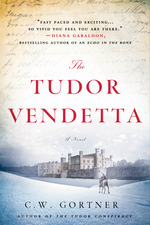I’m delighted to offer an exclusive excerpt from an upcoming
historical novel out May 28. THE CORPSE READER by Antonio Garrido is inspired
by Song Cí, who was considered to be the founding father of CSI-style forensic
science in thirteenth-century China. This historical thriller is drawing
comparisons to The Hangman's Daughter
for its absorbing details of another time and received the Zaragoza
International Prize for best historical novel published in Spain in 2012.
.jpg)
In ancient China during the Song Dynasty only a select few
ever reach the coveted title of "corpse reader," a forensic elite force
which, even at the risk of their own lives, has a mandate that no death go
unsolved and no crime go unpunished. Cí
Song is the first of those elite few.
Envied for his pioneering methods, and persecuted by his peers, he
arouses the curiosity of the emperor himself, who assigns Ci to track a series
of heinous crimes that threaten to destroy the imperial court. But as Ci delves deeper into the mysterious
deaths, there are those who will do anything to silence him—forever.
Excerpted from THE CORPSE READER by Antonio Garrido
Copyright 2013.
Published By AmazonCrossing.
*************************************************************************
Cí got up early that morning to avoid running into his
brother Lu. He could barely pry his eyes open, but he knew that, like every
morning, the paddy field would be awake and waiting.
He got up and began putting away his bedding, smelling the
tea his mother was brewing in the main room. He entered the room and greeted
her with a nod. She replied with a half-hidden smile that he noticed
nonetheless, and he smiled in return.
He adored his mother almost as much as he did his little
sister, whose name was Third. His other sisters, First and Second, had died
very young from a genetic disease. Third was the only one who had managed to
survive, though she remained sickly.
Before breakfast, he went over to the small altar the family
had erected in memory of his grandfather. He opened the wooden shutters and
inhaled deeply. Outside, the first rays of sun were filtering delicately
through the fog. The breeze moved through the chrysanthemums in the offering
jar and stirred the spirals of incense rising in the room. Cí closed his eyes
to recite a prayer, but the only thought that came into his mind was this:
Heavenly spirits, allow us to return to Lin’an.
He cast his mind back to when his grandparents were still
alive. This backwater had been paradise to him then, and to his brother Lu, who
was four years his elder, his hero. Any child would have worshipped Lu. Lu was
like the great soldier in their father’s stories, always coming to Cí’s rescue
when other children tried to steal his fruit rations, always there to deal with
shameless men who tried to flirt with his sisters. Lu had even shown him how to
win a fight using certain kicks and punches. He’d taken him down to the river
to splash around among the boats and to fish for carp and trout, which they’d
then carry home in jubilation. He had also shown Cí the best hiding places from
which to spy on their neighbors.
As Lu got older, though, he became vain. At fifteen, he was
stronger than ever, as well as boastful, and was unimpressed with anything
other than a good right hook. Lu began organizing cat hunts so he could show
off in front of the girls. He’d get drunk on stolen rice liquor and crow about
how he was the strongest in the gang. He became so arrogant that even when
girls were making fun of him he thought they just wanted his attention.
Eventually, all the girls began avoiding Lu, and Cí gradually became
indifferent to his former idol, too.
In spite of everything, Lu had generally managed to steer
clear of any serious trouble, apart from the occasional black eye from fighting
or from riding the community buffalo in the water races. But when their father
announced his intention to move to the capital city of Lin’an, Lu, who was
sixteen at the time, refused to go. Lu didn’t want to move to any city; he was
happy in the countryside. In his eyes, the small village had everything: the
paddy field, his braggart group of friends, even a few local prostitutes for
his amusement. Although his father threatened to disown him, Lu refused to back
down. So that year the family split up: Lu stayed in the village and the rest
of them moved to the capital, in search of a better future.
Cí had found it difficult adjusting to Lin’an life, though
he had a routine. He was up every morning with the sun to check on his sister.
He’d make her breakfast and look after her until their mother came back from
the market. Having wolfed down his bowl of rice, he’d go to classes until
midday, and after that he would run all the way to the slaughterhouse to help
his father in his job clearing away carcasses. In the evening, after cleaning
the kitchen and praying to his ancestors, he studied the Confucian treatises
for recitation in class the next morning. Month after month this was his life.
But one day, everything changed. His father left the slaughterhouse and got a
job as an accountant for the prefecture of Lin’an under Judge Feng, one of the
wisest magistrates in the capital.
.jpg) |
| Antonio Garrido |
Life improved rapidly. The salary his father was now earning
meant that Cí, too, could give up the slaughterhouse and dedicate himself to
his studies. Thanks to excellent grades, after four years in school Cí was
given a junior position in Judge Feng’s department. To begin with, he was given
straightforward administrative tasks, but his dedication and attention to
detail set him apart, and the judge himself decided to take the now
seventeen-year-old under his wing.
Cí showed himself worthy of Judge Feng’s confidence. After
just a few months he began assisting in taking statements, interviewing
suspects, and preparing and cleaning the corpses of anybody who died under
suspicious circumstances. It wasn’t long before his meticulousness, combined
with his obvious talents, made him a key employee, and the judge gave him more
responsibility. Cí ended up helping with criminal investigations and legal
disputes, and thus learned both the fundamentals of law and the basics of
anatomy.
Cí also attended university part time, and in his second
year Judge Feng encouraged him to take a preparatory course in medicine.
According to the judge, the clues to a great many crimes lay hidden in wounds.
To solve them you had to develop not a magistrate’s but rather a surgeon’s
understanding of trauma. Everything was going well until, one night, Cí’s grandfather
suddenly fell ill and died. After the funeral, as was dictated by Chinese
custom, his father was obliged to give up his job as well as the house they had
been living in, since the owner, Cí’s grandfather, was dead. Without a home or
work, the family had to return to the village, the last thing Cí wanted to do.
They came back to a very different Lu. He had built a house
on a plot of land he’d acquired, and he was the boss of a small crew of
laborers. When his father came knocking at his door, the first thing Lu did,
before he would allow him to cross the threshold, was make him get down on his
knees and apologize. He made their father sleep in one of the tiny bedrooms,
rather than give up his own, and treated Cí with the same disinterest. Soon
after, when Lu realized his younger brother no longer worshipped him and cared
only for books, Cí became the target of all Lu’s anger. A man showed his true
value out in the fields, Lu maintained. That was where your daily rice came
from, not from books, not from studying. In Lu’s eyes, his younger brother was
a twenty-year-old good-for-nothing, just one more mouth to feed. Cí’s life
became little more than a series of criticisms, and he quickly came to hate the
village…
A gust of wind brought Cí back to the present.
Going back into the main room, he ran into Lu, who was at
the table beside their mother, slurping his tea. Seeing Cí, he spat on the
floor and banged his cup down on the table. Without waiting for their father to
wake up, he grabbed his bundle of work things and headed out.
“No manners,” muttered Cí, taking a cloth and wiping up the
tea his brother had just spilled.
“And you should learn some respect,” said his mother. “We’re
living in his home, after all. The strong home—”
“I know, I know. ‘The strong home supports a brave father,
prudent mother, obedient son, and obliging brother.’” He didn’t need to be
reminded of the saying. Lu was quite fond of it.
Cí laid the table with the bamboo place mats and bowls; this
was supposed to be Third’s job, but recently her chest illness had been getting
worse. Cí didn’t mind filling in for her. According to ritual, he lined up the
bowls, making sure there was an even number of them, and he turned the teapot
so that its spout pointed toward the window. He placed the rice wine, porridge,
and carp meatballs in the center of the table. He cast his eyes over the
kitchen and the cracked sink all black with carbon. It looked more like a
dilapidated forge than a home.
Soon, his father hobbled in. Cí felt a stab of sadness.
How he’s aged.
Cí frowned and tensed his jaw. His father’s health was
deteriorating: He moved shakily; his gaze was lowered and his sparse beard
looked like some unpicked tapestry. There was barely a shred left of the
meticulous official he had been, the man who had bred in Cí such a love of
method and perseverance. Cí noticed that his father’s hands, which he used to
take such care of, were anemic looking, rough and callused. He imagined his
father must miss the time when his hands had to be immaculate—the days he’d
spent examining judicial dossiers, doing proper work.
Cí’s father sat at the head of the table, motioning for Cí
and his mother to sit as well. Cí went to his place, and his mother took her
seat on the side closest to the kitchen. She served the rice wine. Third didn’t
join them because of her fever.
“Will you be eating with us this evening, Cí?” his mother
asked.
“After all this time, Judge Feng will be delighted to see
you again.”
Cí wouldn’t have missed it for anything. He didn’t know why
exactly, but his father had decided to curtail the mourning period and return
to Lin’an. Cí was hoping Judge Feng would agree to take him back into the
department.
“Lu said I have to take the buffalo up to the new plot, and
after that I was thinking of stopping in on Cherry, but I’ll be back in time
for dinner.”
“Twenty years old and still so naive,” said his father.
“That girl has you wrapped around her finger. You’ll get bored of her if you
carry on seeing so much of each other.”
“Cherry’s the only good thing about this village,” said Cí,
eating his last mouthful of food. “Anyway, you were the ones who arranged the
marriage.”
“Take the sweets I made with you,” said his mother.
Cí got up and put the sweets in his bag. Before leaving the
house, he went into Third’s quarters, kissed her feverish cheeks, and tucked
her hair back. She blinked. Cí took out the sweets and hid them under her
blanket.
“Not a word!” he whispered.
She smiled, too weak to say anything.
**************************************************************************
Excerpted from THE
CORPSE READER by Antonio Garrido, Copyright 2013. Published By AmazonCrossing.
 At the height of the Roman Empire, the lively resort of
Pompeii flourished in the shadow of Mount Vesuvius. When Vesuvius unexpectedly
erupted in a terrifying explosion of flame and ash, the entire town was
destroyed. Some of its citizens perished in the chaos, others escaped the
mountain's wrath. These are their stories:
At the height of the Roman Empire, the lively resort of
Pompeii flourished in the shadow of Mount Vesuvius. When Vesuvius unexpectedly
erupted in a terrifying explosion of flame and ash, the entire town was
destroyed. Some of its citizens perished in the chaos, others escaped the
mountain's wrath. These are their stories:
















.jpg)











.jpg)
.jpg)











